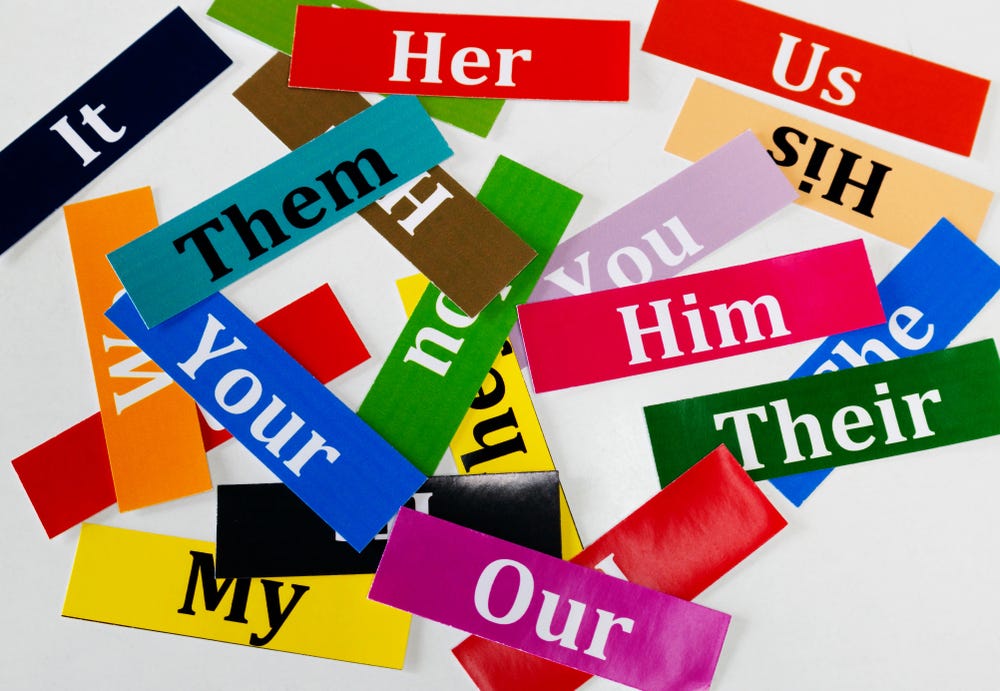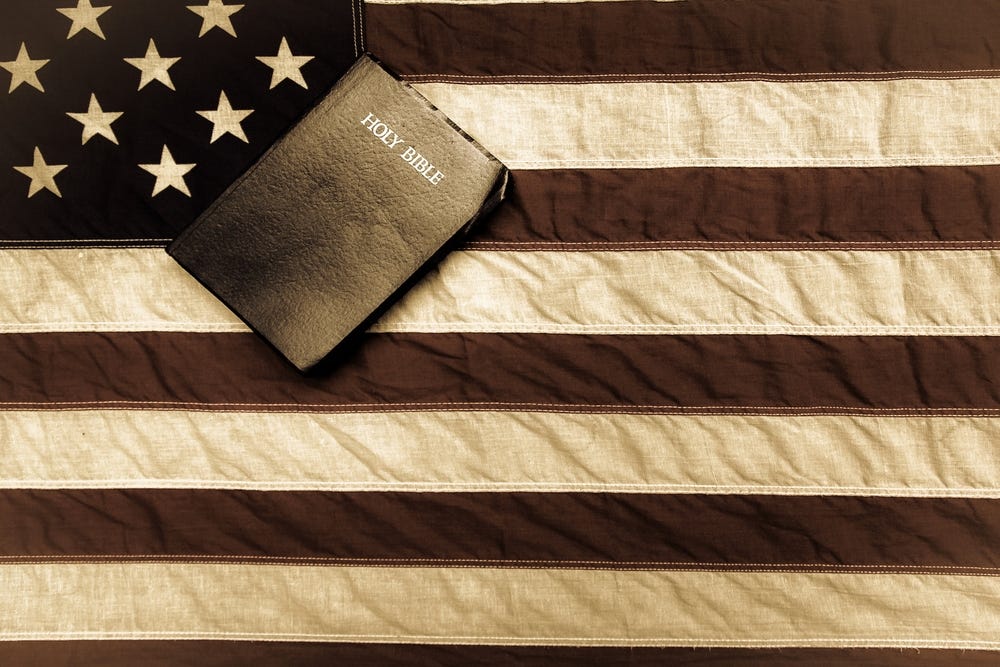E-Pluribus | November 21, 2023
The MeToo movement's asterisk; the pronoun police; and the paradox of Christian nationalism.
A round-up of the latest and best musings on the rise of illiberalism in the public discourse:
Nicole Lampert: MeToo unless you’re a Jew
“Unspeakable” is often used hyperbolically, but it hardly seems adequate to describe the atrocities perpetrated against Israelis on October 7th, women in particular. See also this New York Times story from today. At UnHerd, Nicole Lampert calls out the conspicuous silence from many so-called women’s rights groups on this horrific turn of events.
After Hamas terrorists set about murdering, raping and abducting as many women as they could, one might have expected widespread condemnation from the West’s feminist groups. After all, Hamas had provided enough evidence of its crimes — within hours, they were posting footage of abducted young women in bloodied trousers being paraded around Gaza. Even beforehand, its feminist credentials were hardly glowing: it mandates the hijab, has made it illegal to travel without a male guardian, and refused to ban physical or sexual abuse within the family.
The response among the majority of groups committed to ending violence against women and girls (VAWG) was threefold: to keep quiet, to disbelieve the victims, or to insinuate they deserved their fate. In the words of 140 American “prominent feminist scholars”, to stand in solidarity with Israeli women is to give in to “colonial feminism”.
Here in the UK, this approach is perhaps best embodied in the work of Sisters Uncut, a charity that boasts its own “Feministo” committed to “taking direct action for domestic violence services”. Until this month, the activists’ work has generally taken the form of media-savvy stunts: dyeing the water of Trafalgar Square’s fountains red, setting off rape alarms outside police stations, occupying the roofs of council buildings. Yet all paled in comparison to the demonstration it organised earlier this month: a call for Israel to put down its weapons that ultimately shut down London’s Liverpool Street Station.
[. . .]
Other feminist groups fell into a similar victim-blaming step. Southall Black Sisters, another charity committed to ending violence against women, did at least mourn the loss of life on both sides, but blamed it on “the Israeli government’s declaration of war on Gaza”. Elsewhere, Women for Women UK, which specialises in helping “women survivors of war” and calls itself a “non-partisan organisation”, has decided to raise money only for Palestinian women. Even Women’s Place UK, once viewed as an outlier for its brave campaigning for women-only spaces, decided to call for an “immediate ceasefire” without mentioning sexual violence.
In fact, the only VAWG charity in the UK to call out Hamas’s sexual violence was Jewish Women’s Aid. “Such acts have a permanent impact on survivors and damaging psychological effects on women, particularly women who are victim-survivors of sexual violence,” it said in a statement. “The public silence from many UK domestic/sexual abuse sector organisations further impacts the isolation and fear our clients are experiencing.”
Read it all.
Max Eden: Office of Wokeness Enforcement
If educational institutions paid as much attention to grammar as they do to “pronouns,” test scores would go through the roof. At City Journal, Max Eden writes that even advocates of proper “gendering” are finding it hard to comply with their own rules.
According to the Department of Education, “misgendering” a student could violate federal civil rights law. Last month, the Department’s Office for Civil Rights announced the resolution of its investigation of California’s Taft College for creating a hostile environment under Title IX of the Education Amendments of 1972. OCR investigated the school after a male student was “misgendered” by his professors. The student, who did not notify university administrators that he identified as female, told his professors that he was “trans-femme” and preferred to be addressed by plural pronouns. (Because I’m not employed by a university and am therefore not legally compelled to speak falsely or use improper English, I refer to the student by male pronouns.)
The student’s professors tried to use the plural pronouns but didn’t always succeed. It is understandably difficult for someone delivering collegiate-level instruction to remember to refer to a man as “they” or “them.”
One professor, seemingly realizing her “mistake,” caught herself mid-word and ended up uttering “he-she.” That’s not quite “they,” so the OCR considered that a civil rights violation. The student then told another female professor that he was upset by the failure to address him as he desired. That professor apologized and met with the dean of students to discuss strategies for remembering to use the student’s “proper pronouns.” She seems mostly to have managed to do so, but occasionally she slipped up, too, again contributing to the OCR’s finding. A third female professor referred to the student by male pronouns, realized her “mistake,” and apologized, explaining that when she looked at the student, she saw his physical appearance and referred to him accordingly. Depending on OCR’s interpretation of the Supreme Court’s Bostock ruling, this could be a double civil rights violation—on both gender-identity and sex-stereotype grounds.
The funny or horrifying thing, depending on your point of view, is the faculty’s concern and exasperation in response to the student’s protestations. One professor, after meeting with the dean, had the school’s mental-health services contact the student. Another threw up his hands and exclaimed that he was “too old” to use preferred pronouns. A third asked the student if he had ever tried not thinking about his pronouns so much. A fourth suggested that if the student was so upset about inadvertent misgendering, maybe college wasn’t right for him and he should become an activist instead. The supposed civil rights violators here were mostly female, Californian professors, disproportionately a conscientious and progressive lot. Even they couldn’t quite manage to use preferred pronouns every time and seem to have found the demand annoying.
Read it all here.
Russell Moore: American Christians and the Anti-American Temptation
Churches have been conducting “God and Country” rallies and services for decades, so Russell Moore of Christianity Today asks how America has taken such a hit in the eyes of so many Christians. Of course, America has never been perfect, and Moore says that when an idol doesn’t live up to its acolytes’ expectations, the reaction can be ferocious.
I found myself asking not long ago, “How did the ‘God and country’ Christians become so unpatriotic? Why do so many self-proclaimed ‘Christian nationalists’ seem to hate their own nation? Why do many progressives seem dismissive of any progress?”
This actually should not perplex us. Psychologists have a category for disordered personalities that idealize and then discard. The person whose spouse is expected to meet all spiritual, emotional, and physical needs—to be the perfect “soulmate”—is usually headed for divorce. The parents who build their entire lives around their children’s accomplishments usually end up estranged from them, or even hating them. We cannot love that which is important but not ultimate if we expect it to be ultimate.
That’s what idolatry always does. We expect our idols to fulfill meanings and purposes they never can. When they disappoint us, we tend to reject and rage against them before seeking some other idol where we repeat the process.
A progressive with a view of an upwardly moving and utopian future will ultimately resent anything short of utopia—even if it is an engine so uniquely conducive to justice and human flourishing as liberal democracy. And a conservative with an idealized view of a golden age of the past will soon come to resent an era that doesn’t live up to the illusion.
The Messiahs who don’t live up to our expectations of them are quickly tossed aside for the Barabbases who we believe will.
The American founders were not the Christian models that some forms of Christian propaganda (otherwise known as “lies”) have told us. These same founders were not the cartoon supervillains that other forms of propaganda would characterize them to be either. They were sinners who aspired to something they never lived up to—and that we don’t live up to either. The genius was that they didn’t seek to wipe away those tensions.
[. . .]
A Christian view of humanity should free us to differentiate between a claim to perfection and an aspiration to that which is “more perfect.”
Every era is shot through with grace, and every era since Eden falls short of the glory of God. We can love our parents or our children or our spouses not in spite of the fact that they are flawed but precisely because they are not intended to be our gods.
We can, those of us who are Americans, love America—with all of its flaws and failures—precisely because we don’t expect it to be the kingdom of God.
Read the whole thing.
Around Twitter (X)
Via Steve McGuire, here are a few gems from John Sailer’s exposé on Ohio State University’s faculty recruiting practices:
Here’s Princeton’s Robert P. George on the institutional neutrality:
And finally, from all of us at Pluribus, Happy Truthsgiving, everyone!










